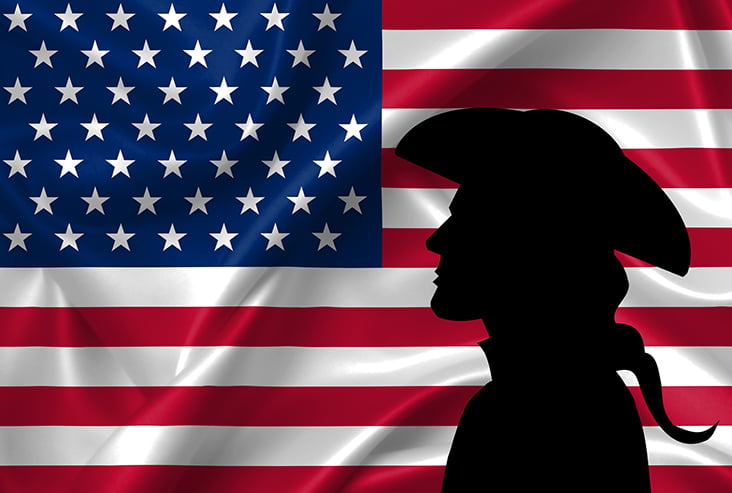In his 1899 book John Adams: The Statesman of the American Revolution and Other Essays, lawyer, historian, and librarian Mellon Chamberlain includes part of an interview he conducted in 1843 with Captain Levi Preston (1756-1850). In his youth, Preston had fought the British at Concord on April 19, 1775. The interview is somewhat amusing as we detect Chamberlain’s increasing frustration as he searches for the reason Preston took up arms. He asks whether Preston had felt oppressed or had fought to oppose the Stamp Act or the tea-tax. When Preston replies in the negative to these questions, Chamberlain says:
“Then I suppose you had been reading Harrington or Sidney and Locke about the eternal principles of liberty.”
“Never heard of ‘em. We read only the Bible, the Catechism, Watt’s Psalms and Hymns, and the Almanack.”
“Well, then, what was the matter? And what did you mean in going to the fight?”
“Young man, what we meant in going for those red-coats was this: we always had governed ourselves, and we always meant to. They (the British) didn’t mean we should.”
Chamberlain then concludes: “And that, gentlemen, is the ultimate philosophy of the American Revolution. It correctly assigns its underlying cause, it explains and accounts for an action of the patriotic party. No other words known to me ever expressed the actual condition of affairs with more historic truth or more tersely. For the attitude of the colonists was not that of slaves seeking liberty, but of freemen—freemen for five generations—resisting political servitude.”
The following summer, Thomas Jefferson penned the Declaration of Independence, which included a lengthy list of grievances against the king and parliament.
Though we have been technically freemen for even longer since Levi Preston picked up his musket that April morning, many Americans today also find themselves resisting political servitude, only this time the enemy comes not from an island-nation across the Atlantic, but from the banks of the Potomac. And like Jefferson’s Declaration, our current inventory of grievances runs long as well. Here are just a few items on that list:
The anaconda that is now our federal government squeezes money out of its citizens in everything from income to gasoline to excise taxes on a wide variety of goods, all while driving our country deeper and deeper into debt.
Government regulations have strangled innovation, business, and commerce.
For over three years, this same government has opened our southern border to all comers without ever giving citizens of the United States a valid explanation for permitting this invasion.
During this same period, federal agencies like the FBI have made arrests and conducted over-the-top home invasions, including former president Donald Trump’s Mar-a-Lago estate.
During the COVID-19 pandemic, the government put its boot on the throat of the First Amendment and wreaked havoc on our nation’s economy, schools, and culture.
Fortunately, more and more Americans have taken the measure of our overreaching federal government and the social causes it embraces and amplifies; and like Captain Preston, they have begun fighting back. Some have resisted simply by turning off mainstream media and looking for truth online. Others have abandoned public schools. Since 2018, the number of students enrolled in homeschools has exploded. Classical academies like Great Hearts are opening and expanding enrollments.
Organizations like Moms for Liberty are standing up for freedom and parents’ rights. While delivering a graduation address this spring, Kansas City Chiefs kicker Harrison Butker spoke up boldly for traditional sex roles and marriage, while the courageous Riley Gaines is leading the charge against transgender women competing in sports against biological females. Under pressure from their consumers, more corporations are discarding or downplaying their DEI (Diversity, Equity, Inclusion) programs. Some universities are doing the same, ridding themselves of these “wasteful and discriminatory programs.”
An enormous gap of disagreement exists between citizens fighting big government and those elites, whom Thomas Sowell characterizes as “the anointed,” who support it. One case in point: Of the registered voters who participated in a 2023 Rasmussen poll, only 16 percent said there was too much individual freedom in the United States, while 57 percent said there was too much government control. In the same poll, Ivy League graduates claimed almost the exact opposite, with 55 percent stating Americans enjoyed too many freedoms and only 15 percent saying the government held too much power.
Those latter statistics would surely have baffled and dismayed men like Thomas Jefferson, John Adams, and other signers of the Declaration. Having put their names to this document, they had mutually pledged “to each other our Lives, our Fortunes, and our sacred Honor” in defense of their liberties.
This Fourth of July, let’s remember who we are. We are Americans, and our birthright is “Life, Liberty and the pursuit of Happiness.” Let’s remember, too, that the safekeeping of that precious commodity, Liberty, requires eternal vigilance, for as John Adams wrote in 1775 to his wife Abigail, “Liberty once lost is lost forever.”
Any government, foreign or domestic, which tampers with our freedoms and attempts to impose “political servitude,” demands our fierce and unceasing opposition.

Leave a Reply